European Women between Tradition and Transition
Transnational meeting in Nicosia
May 7-10, 2009
Host
University of Nicosia, Department of Education,
Nicosia, Cyprus
Panayiotis Angelides
Guests
Organizers and teachers from
|
Casa de la Cultura, Getafe, Spain |
|
CIDF Phocéen, Marseille, France |
|
Dayhighschool for Migrant Women, Copenhagen, Denmark |
|
Women’s Academy Ulm, Germany |
Students from Germany and France
Unfortunately Funda from Turkey could not come to the final meeting because of visa problems.
Contents of the final meeting
|
Presentation of the participants |
|
Approval of the agenda |
|
Latest news from the coordinator |
|
The domestic situation |
|
The homepage and folder |
|
Final Feed-Back |
|
Sustainability - Ideas for the future |
Supporting programme
|
Visit to the International school with Kakia |
|
Presentation of the Outdoors Environmental Project for the Service of Peace »Women in Action« 2007 by Lucy |
|
Presentation of »Cyprus and Gender Policies« by Despina Charalambidou-Solomi |
Final Feed-Back
The outcome and evaluation of this learning partnership was very successful especially for the experience of intercultural dialogue.
Group consistancy: Right from the very first meeting in Ulm/Germany all partners tried to take ownership of the project. It was agreed that the group of organisers should be consisting and that the group of students could vary in size and participants.
Conflict solving: Because of the different practises and experiences of the partners it took some time to overcome misunderstandings and to reach a level of confidence and efficient cooperation and personal friendships. This process was fueld by a common attitude among the participating women: the will to express disagreements, to pay attention to the others opinion and to find ways out.
Common goal: The planned travelling exhibition helped as a common goal and motivated organizers and students “to get things done”. Public presentations of the exhibition with a variety of different art objects served as a common achievement, something to be proud of.
Email contacts: Communication between meetings was organized by email. In the beginning frequency and reliability of email contacts was not equal and sometimes caused frustration especially for the hosts of transnational meetings. In the end all partners except Cyprus have established very close and reliable contacts and are well informed about the domestic situations.
Inclusion of the students: During the transnational meetings national groups needed to get enough time for translations and internal discussions in their mother tongue so that all participants could express their needs and opinions.
Parallel to the organizers sessions which were part of every agenda there needed to be workshops on offer for the students, prefarably with non-verbal activities like crafts, cooking, gymnastics etc.
Women’s rights: In most countries the host of a transnational meeting prepared a presentation of the situation of women, women’s rights and gender politics in the host country. In Spain, France and Cyprus representatives of the local authorities or experts for gender topics came for presentations and discussions about their strategies.
For sustainability of the good collaboration most partners agreed upon further activities beyond the official end of the project. Planned for 2010-2012: Presentation of the exhibition and Grundtvig International Workshops once a year in Germany, Denmark, France, Spain and Turkey.
Only women: This project focuses on women as actors and beneficiaries. |
|



